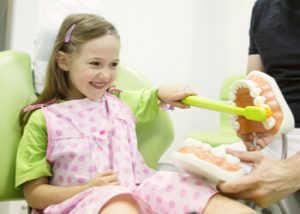Dental care for children should begin as soon as the first tooth emerges or age one. Regular dental care promotes good oral health, but it also helps reinforce positive dental habits. Good dental health can impact a child’s quality of life, giving them confidence and self-esteem in social interactions.
In Australia, the national average of dental caries among children is increasing. Kids between the ages of five and ten are particularly vulnerable. On average, this age group has at least one decayed, missing, or filled tooth.
Poor oral health from a young age can cause lasting damage to the baby teeth, adversely impacting their permanent teeth. Make sure you prioritise kids’ dentistry and instil good dental health habits to minimise potential long-term oral health problems.
Development of Children’s Teeth
Babies typically get their first tooth between six and nine months, with most children having approximately eight teeth by their first birthday. At this point, a child should visit the dentist to become accustomed to the environment, smells and sounds. These early visits also allow the dentist to detect early signs of oral health problems such as baby bottle decay and finger sucking habits.
Most children lose their baby teeth between ages six to twelve. At this developmental stage, it’s essential to introduce a proper dental health routine to avoid infections or tooth decay on emerging permanent teeth.
Common Dental Health Issues for Children
Children can experience the same dental health issues as adults. However, since their teeth are still developing, the repercussions can have more long term implications. If left untreated, kids’ dental problems can cause serious misalignment, tooth loss, or bacterial infections, negatively affecting their speech and general health. Some of the most common kids’ dentistry issues include:
Cavities
It’s estimated that 42% of Australian kids between the ages of five and ten have cavities in their baby teeth. Cavities are damaged or decayed parts of the teeth that create small holes. Although some children are more susceptible to cavities due to genetics, poor oral health hygiene habits increase the risk of developing dental caries.
Factors that increase the risk of cavities include:
- Tooth location (molars and premolars are most at risk)
- Sugary food and drinks
- Bedtime feeding for infants
- Incorrect brushing technique
Depending on your child’s oral health, their dentist may recommend dental sealants before decay occurs. This simple treatment is usually administered between six and fourteen and covers the tooth’s biting surface to protect it from bacteria and plaque, stopping decay before it starts.
Early stage cavities can be repaired through fluoride treatment or fillings. However, failing to treat dental caries can interfere with deeper layers of the teeth. This may cause toothache, infection, or even tooth loss. You can reduce the risk of cavities through routine dental care for children, regular brushing and flossing habits, and a healthy diet.
Sensitivity
While sensitivity isn’t necessarily a significant problem, it can indicate more serious dental issues. Children’s teeth have thinner layers of enamel than adult teeth. If the enamel is worn away by plaque, it can cause gum recession, exposing unprotected layers of the tooth and nerve endings.
Enamel is a protective layer that is vital for protecting a child’s inner teeth against bacteria, plaque, and harmful acids. If your child experiences tooth sensitivity, schedule a dental exam with their dentist.
Gum disease
Gum disease (gingivitis) is usually caused by a combination of poor dental hygiene, plaque and tartar buildup, and genetics. Gum disease can cause developmental issues in a child’s teeth, even progressing to bone damage or tooth loss.
Symptoms of gingivitis include swollen and red gums, bleeding gums or gum recession. Another sign is persistent bad breath.
Lakeside Dental Studio Kids Dentistry
At Lakeside Dental Studio, we provide dental care for children and strive to create positive dental experiences that put your child at ease. As a family-friendly practice, our dental team is experienced in treating young patients offering preventative dental examinations and recommendations for future orthodontic treatment.
Eligible children ages two to seventeen are covered by the Medicare Child Dental Benefit Scheme and can claim up to $1,000 over two calendar years for basic dental services.
Our kids’ dentistry services help your child get comfortable attending dental appointments from a young age, setting them up for a positive relationship with their oral health.
Dental examinations and cleaning
During a dental exam, one of our dental staff performs a hygiene cleaning and assesses your child’s dental health and their risk of decay. These appointments typically include regular scaling, cleaning, and fluoride treatment for decay prevention.
We may recommend an X-ray if we detect any issues. When providing dental care for children, we emphasise good oral hygiene practices, such as encouraging kids to brush twice daily at home and be diligent about flossing.
Orthodontic screening
Common causes of orthodontic issues include genetics, tooth loss, overcrowding, and jaw misalignment. If an oral exam or X-rays show a child has malocclusions, orthodontic screening is often necessary to explore treatment options.
During an orthodontic screening, we take X-rays and examine the positioning of the teeth to evaluate their development. If a child’s permanent teeth appear out of alignment, we may recommend orthodontic treatment, which can begin as soon as age eight.
Orthodontic treatment
We provide conventional metal braces, clear braces, and Invisalign at our practice. Metal braces are the most popular method for straightening children’s teeth, improving alignment, and correcting bite issues.
Childrens’ Oral Health Tips
You can play an integral role in your child’s oral health by educating them on good hygiene practices and being diligent about their dental visits. Kids should: 
- Brush twice per day
- Replace their toothbrush every three months (or when bristles begin to fray)
- Floss once per day
- Attend regular checkups and cleanings (once every six months)
- Eat a healthy, low-sugar diet
Schedule an Appointment at Lakeside Dental Studio Today
If you’re concerned about your child’s oral health, schedule an appointment with Lakeside Dental Studio today. We understand the importance of dental care for children and offer dedicated kids’ dentistry to help your child develop healthy teeth and good oral hygiene habits.
To start your child’s dental care experience off positively, it’s important to schedule regular cleanings and check-ups as soon as their first tooth erupts. This allows your child to become accustomed to visiting the dentist without a negative association. Your child deserves a skilled and experienced dental team that can help lay the foundation for a lifetime of beautiful smiles.
Contact us on (02) 4971 3366 or book an appointment using our online application form today. Your child’s smile is our priority.
References
Australia’s Children
https://www.aihw.gov.au/reports/children-youth/australias-children/contents/health/dental-health
Dental care for children
https://www.healthdirect.gov.au/dental-care-for-children
Dental exam for children
https://www.mayoclinic.org/tests-procedures/dental-exam-for-children/about/pac-20393745
Children’s Oral Health
https://www.cdc.gov/oralhealth/basics/childrens-oral-health/index.html


Recent Comments